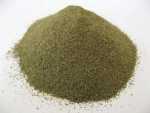Law enforcement issues advisory on herbal product

Local law enforcement agencies are urging residents to remain cautious regarding an over-the-counter herbal product being sold in Mountain Home.
The advisory concerns an herbal product known as kratom currently sold in local smoke shops.
Sold in tinfoil packets, people use the product by chewing the leaves with others smoking it or brewing it with tea.
The Big Smoke tobacco shop in Mountain Home frequently sells it as an herbal pain remedy, including those dealing with chronic back pain, said Ed Franklin, a spokesman with the company's headquarters in Nampa.
"Before we started selling it, we had it analyzed by the state pharmaceutical board," Franklin said. Those tests indicated that the herbal remedy was the equivalent of someone taking aspirin.
While legal to sell and own, krantom is currently listed as a "drug of concern" by the U.S. Drug Enforcement Agency.
While it has medicinal purposes as a therapeutic pain killer similar to morphine, it has the potential for being abused, said Detective Russell Griggs with the Mountain Home Police Department. The leaves from kratom trees contain chemicals that produce reactions similar in nature to narcotics like opium.
The advisory comes just days after local law officials briefed the county commissioners regarding the hazards associated with the product. It followed a report that at least one business in Mountain Home advertising it on a sign in front of their shop.
While there were no reports of incidents in the Mountain Home area regarding people using the product, Griggs added that some people in the United States have overdosed after using it.
People who stop using kratom are known to go into withdraw with symptoms similar to those who abuse oxycodone or use heroin. According to the U.S. Drug Enforcement Agency. Users can experience a range of withdraw symptoms, including muscle and joint pain, watery eyes and spastic limb movements with some people displaying signs of hostility and aggression.
In addition, those who combine kratom with nervous system depressants may go into respiratory arrest and stop breathing, the DEA reported.
Franklin was unaware if kratom was responsible to any rise in medical problems from people taking it. However, he emphasized that other medications and herbal remedies people take on a regular basis can have negative side effects if misused.
In addition, Big Smoke shops like the one in Mountain Home carry pamphlets with information on kratom. They are available to customers wanting to know more about the herbal product, especially those wanting to try it for the first time, Franklin said.
While stores that carry kratom cater specifically to adults, it's ending up in the hands of Mountain Home teens, which is raising concerns with law enforcement officials. Griggs said that it was recently spotted at Mountain Home Junior High School.
Information on kratom spreads by word of mouth through social media sites and through text messages, according to Steven Dye, chief of Elmore County's juvenile probations office. Officers spot that information as they monitor local juveniles that are on parole for various offenses.
As a condition of their parole, these individuals waive their right to privacy. This allows probation officers to monitor their text messages and updates to online social media sites.
"It's amazing what probation officers find on Facebook," Dye said as an example. "It's not even password protected. It's out there for everyone to see."
The visibility of kratom in the Mountain Home area is alarming, according to local law enforcement officials.
"It is known to be a very dangerous drug but not illegal," Dye said.
The advisory comes four years after a similar product known as Spice was banned in Idaho. Also sold in local smoke shops as an herbal incense, Spice included a mixture of synthetic cannabinoid -- the generic term of compounds similar to THC, or the active ingredient in marijuana.
But instead of using it as incense, adults as well as junior high school and high school students started smoking it trying to get high. However, Spice use led to several incidents in the Mountain Home area with at least eight emergency calls involving individuals experiencing physical or psychological problems after they smoked the substance. At least one victim was taken by air ambulance to a regional medical center in Boise due to medical complications from smoking the substance.
According to Dye, it's tough for police crime labs to keep up with all the products sold across the United States that have potentially hazardous or even deadly side effects if misused. Those making these products simply change a chemical component in these substances that allows them to be sold legally once again.
That's why it's important for parents to remain vigilant and act as a first line of defense against these types of dangers, he added.
"We have to be diligent and not by shy about telling our friends and neighbors" when their child's behavior indicates they are using alcohol and drugs, Dye said.
At the same time, parents need to avoid being defensive and remain open to hearing these types of warnings, even when it involves their children.
"In this community, we are hard pressed to find ones that are not pressured to use alcohol or drugs, especially marijuana," Dye said.
Alcohol and drugs have a certain attraction for teens, which is why they find their way into local schools.
"It's sad that we have kids 9 and 10 years old that are having to make a decision and choices over whether or not they should use drugs or alcohol," Dye said.
